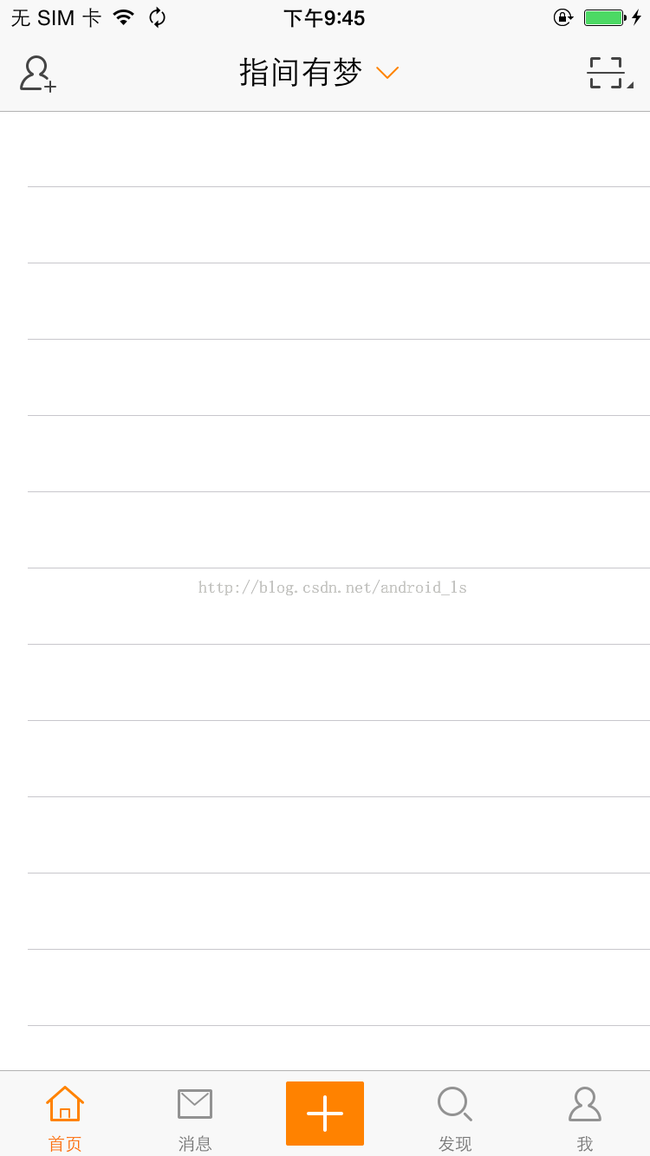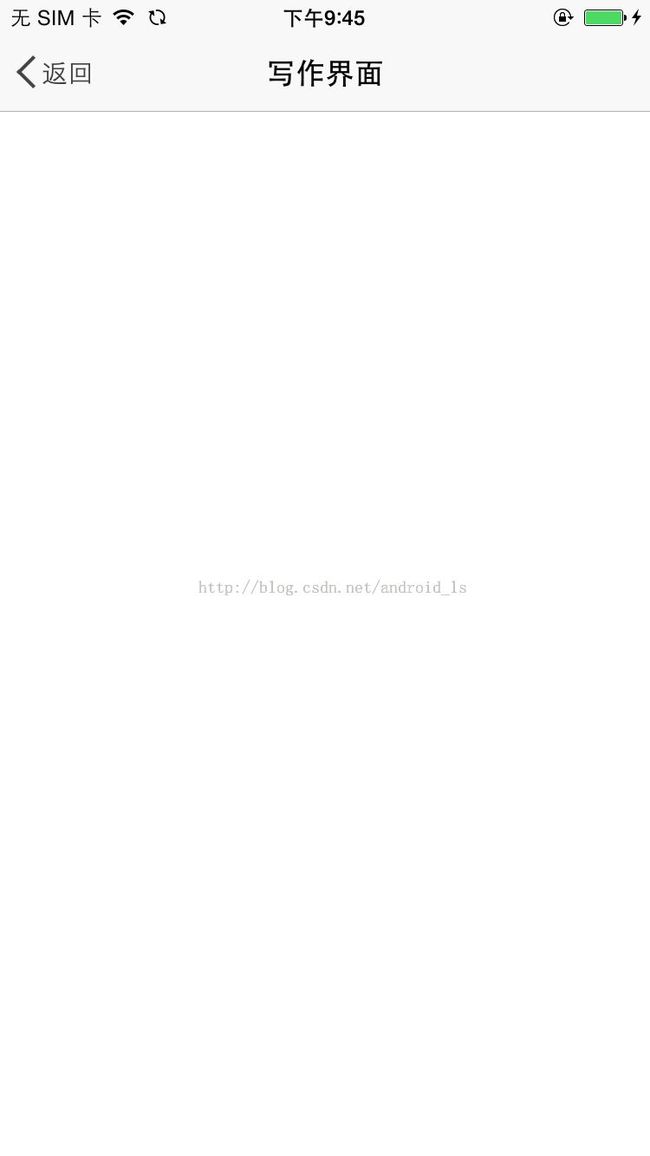仿新浪微博IOS客户端(v5.2.8)——自定义UITabBar替换系统默认的(添加“+”号按钮),
仿新浪微博IOS客户端(v5.2.8)——自定义UITabBar替换系统默认的(添加“+”号按钮),v5.2.8uitabbar
转载请标明出处:http://blog.csdn.net/android_ls/article/details/45896395
声明:仿新浪微博项目,所用所有图片资源都来源于官方新浪微博IOS客户端,编写本应用的目的在于学习交流,如涉及侵权请告知,我会及时换掉用到的相关图片。
自定义UITabBar替换系统默认的,目的是为了在UITabBar中间位置添加一个“+号按钮”,下面我们来聊聊具体的实现。
1、自定义WBTabBar,让其继承自UITabBar,代码如下:
// // WBTabBar.h // SinaWeibo // // Created by android_ls on 15/5/21. // Copyright (c) 2015年 android_ls. All rights reserved. // #import <UIKit/UIKit.h> @interface WBTabBar : UITabBar @end
2、tabBar是UITabBarController的只读成员变量(属性),是不让修改的,在UITabBarController.h文件中的声明如下:
@property(nonatomic,readonly) UITabBar *tabBar NS_AVAILABLE_IOS(3_0);
针对于这种情况,我们可以使用KVC的方式,更换系统自带的UITabBar,实现代码如下:
WBTabBar *tabBar = [[WBTabBar alloc] init]; [self setValue:tabBar forKeyPath:@"tabBar"];
3、添加一个UIButton到WBTabBar中,实现代码如下:
- (id)initWithFrame:(CGRect)frame
{
self = [super initWithFrame:frame];
if (self) {
// 添加一个按钮到tabbar中
UIButton *plusBtn = [[UIButton alloc] init];
[plusBtn setBackgroundImage:[UIImage imageNamed:@"tabbar_compose_button"] forState:UIControlStateNormal];
[plusBtn setBackgroundImage:[UIImage imageNamed:@"tabbar_compose_button_highlighted"] forState:UIControlStateHighlighted];
[plusBtn setImage:[UIImage imageNamed:@"tabbar_compose_background_icon_add"] forState:UIControlStateNormal];
[plusBtn setImage:[UIImage imageNamed:@"tabbar_compose_icon_add_highlighted"] forState:UIControlStateHighlighted];
plusBtn.size = plusBtn.currentBackgroundImage.size;
[plusBtn addTarget:self action:@selector(plusClick) forControlEvents:UIControlEventTouchUpInside];
[self addSubview:plusBtn];
self.plusBtn = plusBtn;
}
return self;
}
4、设置加号按钮的位置,调整WBTabBar中各个UITabBarButton的位置和宽度,具体实现代码如下:
- (void)layoutSubviews
{
[super layoutSubviews];
// 1.设置加号按钮的位置
self.plusBtn.centerX = self.width * 0.5;
self.plusBtn.centerY = self.height * 0.5;
// 2.设置其它UITabBarButton的位置和尺寸
CGFloat tabbarButtonW = self.width / 5;
CGFloat tabbarButtonIndex = 0;
for (UIView *child in self.subviews) {
Class class = NSClassFromString(@"UITabBarButton");
if ([child isKindOfClass:class]) {
// 设置宽度
child.width = tabbarButtonW;
// 设置x
child.x = tabbarButtonIndex * tabbarButtonW;
// 增加索引
tabbarButtonIndex++;
if (tabbarButtonIndex == 2) {
tabbarButtonIndex++;
}
}
}
}
5、定义WBTabBarDelegate协议,声明WBTabBar的代理,代码如下:
// // WBTabBar.h // SinaWeibo // // Created by android_ls on 15/5/21. // Copyright (c) 2015年 android_ls. All rights reserved. // #import <UIKit/UIKit.h> #pragma mark 因为在UITabBar中已经声明过一个UITabBarDelegate协议, #pragma mark 我们若想新增一个对外的代理函数,可以让我们自定义的协议继承自UITabBarDelegate,添加一个扩展函数。 @class WBTabBar; @protocol WBTabBarDelegate <UITabBarDelegate> @optional - (void)tabBarDidClickPlusButton:(WBTabBar *)tabBar; @end @interface WBTabBar : UITabBar @property (nonatomic, weak) id<WBTabBarDelegate> tabBarDelegate; @end
6、在加号按钮的点击事件处理器中,通知代理
#pragma mark 加号按钮点击事件处理器
- (void)plusClick
{
// 通知代理
if ([self.tabBarDelegate respondsToSelector:@selector(tabBarDidClickPlusButton:)]) {
[self.tabBarDelegate tabBarDidClickPlusButton:self];
}
}
7、在WBTabBarController中设置WBTabBar的代理,具体实现如下:
// 2、使用KVC的方式,更换系统自带的UITabBar WBTabBar *tabBar = [[WBTabBar alloc] init]; tabBar.tabBarDelegate = self; [self setValue:tabBar forKeyPath:@"tabBar"];
#pragma mark - HWTabBarDelegate代理方法
- (void)tabBarDidClickPlusButton:(WBTabBar *)tabBar
{
ComposeViewController *composeViewController= [[ComposeViewController alloc] init];
UINavigationController * navigationController = [[UINavigationController alloc]initWithRootViewController:composeViewController];
[self presentViewController:navigationController animated:YES completion:nil];
}
8、有图有真相,已实现的效果图如下:
点击加号按钮,弹出写作界面,效果图如下:
WBTabBarController.m文件完整源码如下:
//
// WBTabBarController.m
// SinaWeibo
//
// Created by android_ls on 15/5/17.
// Copyright (c) 2015年 android_ls. All rights reserved.
//
#import "WBTabBarController.h"
#import "HomeViewController.h"
#import "MessageViewController.h"
#import "DiscoverViewController.h"
#import "ProfileViewController.h"
#import "WBNavigationController.h"
#import "WBTabBar.h"
#import "ComposeViewController.h"
@interface WBTabBarController ()<WBTabBarDelegate>
{
HomeViewController * _homeViewController;
MessageViewController * _messageViewController;
DiscoverViewController * _discoverViewController;
ProfileViewController * _profileViewController;
}
@end
@implementation WBTabBarController
- (void)viewDidLoad {
[super viewDidLoad];
// 初始化子控制器,并将其添加到UITabBarController中
_homeViewController = [[HomeViewController alloc]init];
[self addChildController:_homeViewController title:@"首页" image:@"tabbar_home"];
_messageViewController = [[MessageViewController alloc]init];
[self addChildController:_messageViewController title:@"消息" image:@"tabbar_message_center"];
_discoverViewController = [[DiscoverViewController alloc]init];
[self addChildController:_discoverViewController title:@"发现" image:@"tabbar_discover"];
_profileViewController = [[ProfileViewController alloc]init];
[self addChildController:_profileViewController title:@"我" image:@"tabbar_profile"];
// @property(nonatomic,readonly) UITabBar *tabBar NS_AVAILABLE_IOS(3_0);
// tabBar是UITabBarController的只读成员变量(属性),是不让修改的
// 2、使用KVC的方式,更换系统自带的UITabBar
WBTabBar *tabBar = [[WBTabBar alloc] init];
tabBar.tabBarDelegate = self;
[self setValue:tabBar forKeyPath:@"tabBar"];
}
#pragma mark - HWTabBarDelegate代理方法
- (void)tabBarDidClickPlusButton:(WBTabBar *)tabBar
{
ComposeViewController *composeViewController= [[ComposeViewController alloc] init];
UINavigationController * navigationController = [[UINavigationController alloc]initWithRootViewController:composeViewController];
[self presentViewController:navigationController animated:YES completion:nil];
}
/**
* 添加子控制器到UITabBarController中
*/
- (void)addChildController:(UIViewController *)childViewController title:(NSString *)title image:(NSString *)image
{
// 设置子控制器,tabbar和navigationBar上的title
childViewController.title = title;
// 设置tabBarItem上默认的指示图片和选中时的图片
childViewController.tabBarItem.image = [UIImage imageNamed:image];
childViewController.tabBarItem.selectedImage = [[UIImage imageNamed:[NSString stringWithFormat:@"%@%@", image, @"_selected"]]imageWithRenderingMode:UIImageRenderingModeAlwaysOriginal];
// 设置tabBarItem上文字的样式(这里是设置文字在不同状态下的颜色值)
[childViewController.tabBarItem setTitleTextAttributes:
@{NSForegroundColorAttributeName:kColor(117, 117, 117)} forState:UIControlStateNormal];
[childViewController.tabBarItem setTitleTextAttributes:
@{NSForegroundColorAttributeName:kColor(253, 109, 10)} forState:UIControlStateSelected];
// 使用系统默认的UINavigationController
// [self addChildViewController:[[UINavigationController alloc] initWithRootViewController:childViewController]];
// 使用我们自定义的导航栏(WBNavigationController继承自UINavigationController)
WBNavigationController * navigationController = [[WBNavigationController alloc]initWithRootViewController:childViewController];
[self addChildViewController:navigationController];
}
@end
WBTabBar.h文件完整源码如下:
// // WBTabBar.h // SinaWeibo // // Created by android_ls on 15/5/21. // Copyright (c) 2015年 android_ls. All rights reserved. // #import <UIKit/UIKit.h> #pragma mark 因为在UITabBar中已经声明过一个UITabBarDelegate协议, #pragma mark 我们若想新增一个对外的代理函数,可以让我们自定义的协议继承自UITabBarDelegate,添加一个扩展函数。 @class WBTabBar; @protocol WBTabBarDelegate <UITabBarDelegate> @optional - (void)tabBarDidClickPlusButton:(WBTabBar *)tabBar; @end @interface WBTabBar : UITabBar @property (nonatomic, weak) id<WBTabBarDelegate> tabBarDelegate; @end
WBTabBar.m文件完整源码如下:
//
// WBTabBar.m
// SinaWeibo
//
// Created by android_ls on 15/5/21.
// Copyright (c) 2015年 android_ls. All rights reserved.
//
#import "WBTabBar.h"
@interface WBTabBar()
@property (nonatomic, weak) UIButton *plusBtn;
@end
@implementation WBTabBar
- (id)initWithFrame:(CGRect)frame
{
self = [super initWithFrame:frame];
if (self) {
// 添加一个按钮到tabbar中
UIButton *plusBtn = [[UIButton alloc] init];
[plusBtn setBackgroundImage:[UIImage imageNamed:@"tabbar_compose_button"] forState:UIControlStateNormal];
[plusBtn setBackgroundImage:[UIImage imageNamed:@"tabbar_compose_button_highlighted"] forState:UIControlStateHighlighted];
[plusBtn setImage:[UIImage imageNamed:@"tabbar_compose_background_icon_add"] forState:UIControlStateNormal];
[plusBtn setImage:[UIImage imageNamed:@"tabbar_compose_icon_add_highlighted"] forState:UIControlStateHighlighted];
plusBtn.size = plusBtn.currentBackgroundImage.size;
[plusBtn addTarget:self action:@selector(plusClick) forControlEvents:UIControlEventTouchUpInside];
[self addSubview:plusBtn];
self.plusBtn = plusBtn;
}
return self;
}
#pragma mark 加号按钮点击事件处理器
- (void)plusClick
{
// 通知代理
if ([self.tabBarDelegate respondsToSelector:@selector(tabBarDidClickPlusButton:)]) {
[self.tabBarDelegate tabBarDidClickPlusButton:self];
}
}
- (void)layoutSubviews
{
[super layoutSubviews];
// 1.设置加号按钮的位置
self.plusBtn.centerX = self.width * 0.5;
self.plusBtn.centerY = self.height * 0.5;
// 2.设置其它UITabBarButton的位置和尺寸
CGFloat tabbarButtonW = self.width / 5;
CGFloat tabbarButtonIndex = 0;
for (UIView *child in self.subviews) {
Class class = NSClassFromString(@"UITabBarButton");
if ([child isKindOfClass:class]) {
// 设置宽度
child.width = tabbarButtonW;
// 设置x
child.x = tabbarButtonIndex * tabbarButtonW;
// 增加索引
tabbarButtonIndex++;
if (tabbarButtonIndex == 2) {
tabbarButtonIndex++;
}
}
}
}
@end
ComposeViewController继承自UIViewController,主要实现在m文件,其完整代码如下:
//
// ComposeViewController.m
// SinaWeibo
//
// Created by android_ls on 15/5/21.
// Copyright (c) 2015年 android_ls. All rights reserved.
//
#import "ComposeViewController.h"
#import "UIBarButtonItem+Category.h"
@interface ComposeViewController ()
@end
@implementation ComposeViewController
- (void)viewDidLoad {
[super viewDidLoad];
self.title = @"写作界面";
self.view.backgroundColor = [UIColor whiteColor];
self.navigationItem.leftBarButtonItem = [UIBarButtonItem itemWithTarget:self
action:@selector(back)
image:@"navigationbar_back_withtext"
highImage:@"navigationbar_back_withtext_highlighted"
title:@"返回"];
}
- (void)back
{
[self.navigationController dismissViewControllerAnimated:YES completion:^{}];
}
@end

